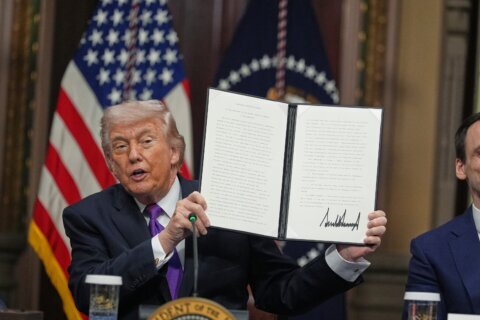This article was republished with permission from WTOP’s news partner InsideNoVa.com. Sign up for InsideNoVa.com’s free email subscription today.
This article was written by WTOP’s news partner InsideNoVa.com and republished with permission. Sign up for InsideNoVa.com’s free email subscription today.
An Arlington County Circuit Court judge is promising to rule quickly after hearing arguments Wednesday afternoon in the lawsuit filed by seven Virginia school boards against Gov. Glenn Youngkin’s executive order allowing parents to opt out of mask mandates in schools.
Lawyers representing the seven school division plaintiffs and Youngkin made their initial arguments before Judge Louise DiMatteo, with both sides asking for immediate action to either uphold Youngkin’s order or allow school divisions to continue enforcing mask mandates as they’ve done all school year.
The seven school boards – Alexandria, Arlington, Fairfax, Falls Church, Hampton, Prince William and Richmond – are seeking an injunction to immediately suspend Youngkin’s order.
All seven have continued to enforce their mandatory masking policies, with work-arounds such as social distancing or isolated learning rooms for students who have applied for exemptions. In many other Virginia localities, Youngkin’s one executive order, issued just hours after he was inaugurated Jan. 15, has allowed students free to go maskless in school buildings.
Representing the school boards Wednesday, Fairfax attorney John Cafferky argued that Youngkin’s order didn’t fall under the emergency powers granted by the General Assembly to address the public health crisis because it wasn’t meant to suppress the spread of COVID-19.
He also argued that the order runs afoul of Senate Bill 1303, which was passed by the assembly and signed into law last year. That law, which sunsets in August, requires school divisions to offer in-person learning and to adhere to Centers for Disease Control guidance on mitigating the spread of COVID to the maximum extent “practicable.”
“There are many students and there are many staff who have significant medical conditions,” Cafferky told DiMatteo, saying that the decision on which mitigation strategies are practical should be left to local governing bodies, based on their individual circumstances. Youngkin’s order, he said, was an unprecedented attempt to force the governor’s interpretation of individual parental rights on school divisions under emergency powers granted to stem the spread of a deadly pandemic.
“When it comes to educating kids in person, SB1303 says how to do it,” said Cafferky, arguing that the boards are governed by the General Assembly and the state’s constitution, which vests in them control over local schools.
Ultimately, Cefferky said, the case would address whether local officials had a say in “how they’re going to be able to run their schools in Virginia.”
But Steven Popps – a deputy attorney general for Virginia arguing on behalf of Youngkin – said the governor was well within his “exceptionally broad” emergency rights to issue executive orders that served as law, and that SB1303 doesn’t “displace” the governor’s authority.
Both laws, he argued, could coexist, and that it couldn’t be “practicable” for divisions to adhere to a mitigation strategy that violated state law. The same goes for vaccines, he said. No school division has decided to adopt a vaccine mandate for students and staff, despite the CDC recommending vaccines for all who are eligible.
“The school boards are not independent sovereigns that are answerable to no higher power,” Popps said. “SB1303 does not require rigid, compulsory adherence to every mitigation strategy …. No school board is even remotely following all the applicable guidance.”
DiMatteo’s ruling seems likely to affect mask policy for the seven school divisions only temporarily, because both sides have signaled a willingness to take their case to the Supreme Court of Virginia if the circuit court rules against them.
DiMatteo said she was aware of the urgency of the matter and promised a swift ruling after reviewing all the filings and oral arguments.
“I don’t intend to take very long to decide this,” she said following Wednesday’s hearing. “People are waiting to have an answer.”







